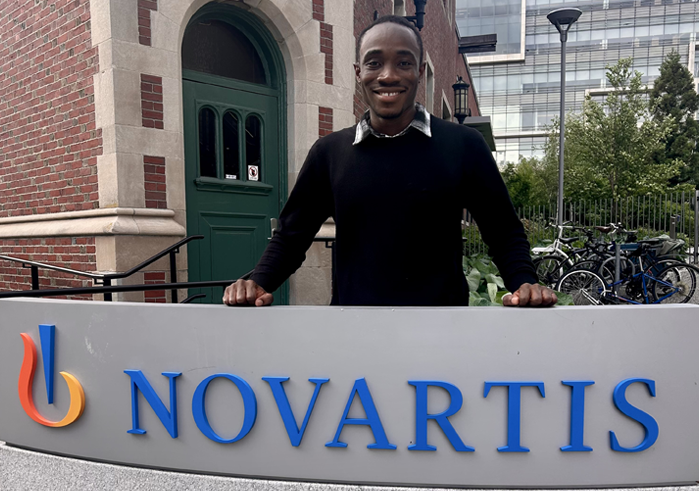Edem Wordi ’27 Applies Soka Values to Antibody Research at Novartis

Growing up in Ghana, Edem Wordi ’27 learned early on how perseverance and compassion go hand in hand. He remembers watching his mother run a small business while raising him and his siblings and finding ways to support others in their community.
“Even when resources were scarce,” Wordi said, “she found creative ways to help others. That resilience and empathy remind me that every challenge, whether academic or personal, is an opportunity to serve with purpose.”
Those early lessons taught him to view education not just as a vehicle of personal advancement, but as a means to uplift others. Daily challenges in his community, such as limited access to clean water and healthcare, sparked his curiosity about science and its potential to address global inequalities. “Even before coming to SUA,” he said, “I was fascinated by how simple materials could be transformed into tools that improve people’s daily lives.”
Arriving at SUA’s Aliso Viejo campus ready to explore the intersection of science, innovation, and service, Wordi discovered a passion for bioinformatics. This happened after attending the Developing Future Biologist Program at the University of Michigan, where he realized how technology could accelerate breakthroughs in healthcare. He then took a biostatistics class with Professor Marie Nydam that deepened his interest in the field, eventually leading to a research assistant role at Novartis Biomedical in Cambridge, Mass., during the summer of 2025. Wordi secured the internship independently, while SUA’s Summer Student Research Assistantship Program provided institutional support, including CPT documentation guidance and professional development workshops, to help him prepare for and navigate the experience.
Reflecting on his experience at Novartis, which challenged him to apply his classroom learning and hands-on training at SUA to real-world biomedical research, Wordi highlights the rigor and collaboration of professional research. Describing his work in practical terms, Wordi explained how every antibody has a unique “barcode” from our DNA.
“Think of the DNA like a recipe book that tells your body what kind of antibody to make and how to make them,” he said. “Using computer science, we write programs that can quickly read and compare thousands of these barcodes to understand what makes one antibody more effective than another. It’s like searching for hidden clues in nature’s own database to improve how we design medicines.”
The implications of his research are far-reaching, including accelerating the development of new antibody-based therapies for cancer, autoimmune diseases, and viral infections. “It also helps scientists make existing drugs safer and more effective,” he said, “by predicting how our immune systems might respond before clinical trials even begin.”
Groundbreaking as the science at Novartis was, Wordi was equally struck by how deeply collaboration shaped the work — even in a computational field. “I was constantly moving between biology, mathematics, and computer science knowledge to ensure that my analysis was meaningful,” he said. “It taught me that science isn’t just about algorithms; it’s about communication and teamwork across disciplines.”
After several years of immersion in Soka’s interdisciplinary liberal arts curriculum, including Life Sciences courses where he acquired laboratory skills and field techniques, Wordi was adept at making connections between science, ethics, and global citizenship. “Soka’s curriculum trains you to see connections everywhere,” he said. “Whether in philosophy or environmental studies, I’ve learned to ask ‘why’ before ‘how.’ That mindset helped me approach antibody data not just as numbers, but as part of a bigger story about health equity, innovation, and ethics.”
When asked how SUA’s core values guide his research, Wordi said that wisdom helps him interpret data responsibly, courage allows him to question assumptions and venture into unfamiliar fields, and compassion reminds him why the work matters. “Because behind every dataset,” he added, “there are real patients and communities who deserve better health outcomes.”
He believes that Soka students have an important role to play in bringing these core values to the field of medicine, especially at a time when AI-driven biomedical research has the potential to benefit everyone, not just wealthy populations.
“Soka students are trained to think critically about global justice and the human implications of technology,” he said. “That perspective is crucial when building algorithms that could one day influence healthcare decisions for millions of people.”
Looking ahead to his life and career after Soka, Wordi hopes to continue bridging science and service. “I hope to build a career at the intersection of computational biology and sustainable biomaterials, using data-driven research to create accessible health and hygiene solutions for underserved regions,” he said. “Ultimately, I want my work to bridge science and society — to make innovation not just advanced, but inclusive.”
